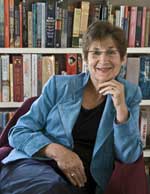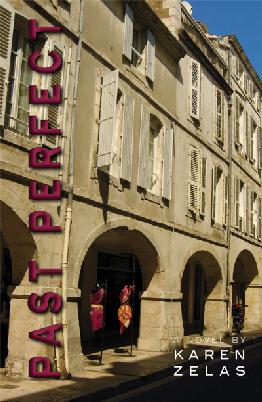Karen Zelas
 Karen Zelas always knew she wanted to be a writer. It wasn’t until she gave up her day job as a psychiatrist and psychotherapist that she really began to write creatively. She has since become an accomplished writer of prose and poetry and editor of Takahe. Her first novel, Past Perfect, was published by Wily Publications in May 2010. Past Present weaves together two Christchurch stories—one set in historical Akaroa and one in modern day Christchurch. Karen Zelas lives and works in Christchurch, New Zealand.
Karen Zelas always knew she wanted to be a writer. It wasn’t until she gave up her day job as a psychiatrist and psychotherapist that she really began to write creatively. She has since become an accomplished writer of prose and poetry and editor of Takahe. Her first novel, Past Perfect, was published by Wily Publications in May 2010. Past Present weaves together two Christchurch stories—one set in historical Akaroa and one in modern day Christchurch. Karen Zelas lives and works in Christchurch, New Zealand.
She spoke to Berinda Joy from Christchurch City Libraries.
- We were all disappointed when The Press Christchurch Writers Festival was cancelled. What were you planning to share at your session, “Hot off the Press?” Did that selection change post-earthquake (before the announcement was made that it was cancelled)?
- Yes, I was disappointed, too, when the Festival had to be cancelled, not only because of missing the opportunity to share aspects of my own novel, Past Perfect, but because I had been looking forward to listening to other writers speak about their works and the process of writing. To be honest, I hadn’t firmly decided what I was going to share at the session prior to the earthquake. I suppose I had wanted to speak of the process of developing an idea into a book, how I started with a unique piece of New Zealand history, developed two central female characters, one historical and the other contemporary, and fashioned two fictional stories which I interwove throughout the novel.
- You are not Canterbury born and raised but you live in Christchurch and your first novel, Past Perfect, is set in modern-day Christchurch and 1840s Akaroa. What are your reflections on the Garden City? Why do you think Christchurch has so influenced your writing?
- I have lived all my adult life in Christchurch, some forty years, and it has become my home. It took time to get used to living on the flat, but the gardens and trees have been compensation for the loss of a view. I have grown to love the scenery of Canterbury, particularly the hills, bays and skies of Banks Peninsula, and the French history of Akaroa has fascinated me. Teachers of creative writing usually encourage students to write about what they know, so it is not surprising, perhaps, that I would set my first novel here in Canterbury. However, the subject of pioneering and settlement and the hardships endured is relevant to the whole of this country.
 Past Perfect is about your heroine’s multiple journeys, internal and external. Sue’s major external journey involves her delving into her genealogy. What has been your journey to research this book, portions of which are historical fiction? Did you use libraries for your research? How do you view and use libraries?
Past Perfect is about your heroine’s multiple journeys, internal and external. Sue’s major external journey involves her delving into her genealogy. What has been your journey to research this book, portions of which are historical fiction? Did you use libraries for your research? How do you view and use libraries?- I had never undertaken genealogical research, but I wanted Sue’s process to be as authentic as possible and so sought advice from a friend for whom it has become a consuming passion. Then, to experience something of the process, I went, as Sue does, to Identity Services, who referred me to the Microfiche Department at the Central Library, and I sought out the birth records of my father. In the Library and in the Akaroa Museum, I found almost all the relevant historical information, certainly all I needed. Also, like Sue, I visited the Marine Archives in Rochefort, France. Everywhere I searched, I found library and museum staff most interested and helpful, and it was a very enjoyable, even compelling, process.
- In your former career you were a psychiatrist and psychotherapist. How has that work informed your fiction writing?
- I suppose my former career has given me a depth of understanding of people, their emotions and relationships and how they behave, which I am able to draw upon in my writing. I have also been an observer and recorder of fine detail, which is a useful skill. But the actual characters and plots I create are from my imagination.
- You are in the unique position of being both an editor and a writer. You edited the collection, Crest to Crest: Impressions of Canterbury, prose and poetry, and you have been Fiction Editor of the literary magazine Takahe since 2007. What has it been like transitioning from editing other writers’ work to collaborating with an editor for your own?
- Editing a magazine or an anthology is somewhat different from editing a piece of work, like a novel. The former involves a selection process and the editors of many literary magazines give no feedback to writers. In editing for Takahe, I do try to give back constructive criticism, as one of our objectives is to help emerging New Zealand writers develop their skills. I found it an interesting experience being on the receiving end, as it were. With Past Perfect, I was extremely fortunate to have Antoinette Wilson as my editor, and she provoked me into improving the novel’s shape considerably. The experience confirmed for me how helpful constructive feedback from a good editor can be in the revision process. You can become so close to your own writing that you cannot see it objectively, and, of course, it is impossible to read it and hear it as a first-time reader would. You have so much knowledge about your characters and their actions that you may not see flaws, or gaps, or leaps of faith that you are asking the reader to make.
- There is a passage in Past Perfect that reads, “…Sue extended a hand and laid it between Ben’s shoulder blades, but her touch did not penetrate. In another age, they had fallen asleep entwined. One plus one making one.” This is a beautiful bit of writing. Are there particular passages of your novel, or your poetry, that linger with you? Passages you still think about after the book has hit the bookshops?
- The process of getting a book published is so lengthy that you are likely to be thoroughly embedded in the next project before it hits the shelves. So your mind is no longer with the new publication. However, there are pieces I am attached to, and the segment you quote is one of them. I suppose lines of my poetry linger longer with me, perhaps because they are more a record of my personal experience.
- How important is the space in which you write? Where do you do most of your writing?
- Having my own space and the nature of that space are important to me. Out of necessity, the first two or three drafts of Past Perfect were written in very cramped, shared spaces. But now I have taken over a spare bedroom with sun, a balcony, French doors that allow birdsong to enter and a view over neighbouring trees – and I love it.
- Lastly, what book(s) went into the building of you? What book(s) wouldn’t you be “Karen Zelas” without?
- Where does one start and end? The first book I remember reading to myself was The Tree That Sat Down by Beverley Nichols. But I wouldn’t be me, as a writer, without all the books I have read about child development, personality, behaviour, mental illness, abuse and violence. Perhaps these distinguish me from many other writers and compensate in some measure for not having had a substantial Classical, English and Arts education.
Thank you, Brindi, for this opportunity to speak with you and your readers.
More information
- Visit Karen’s website and read the first five chapters of Past Present
- Find Karen’s books at Christchurch City Libraries

